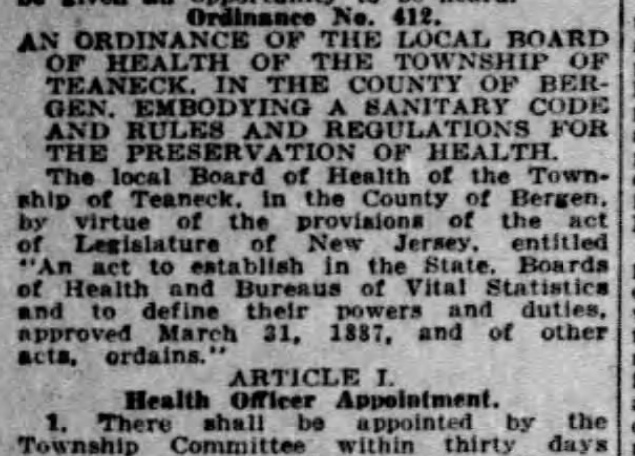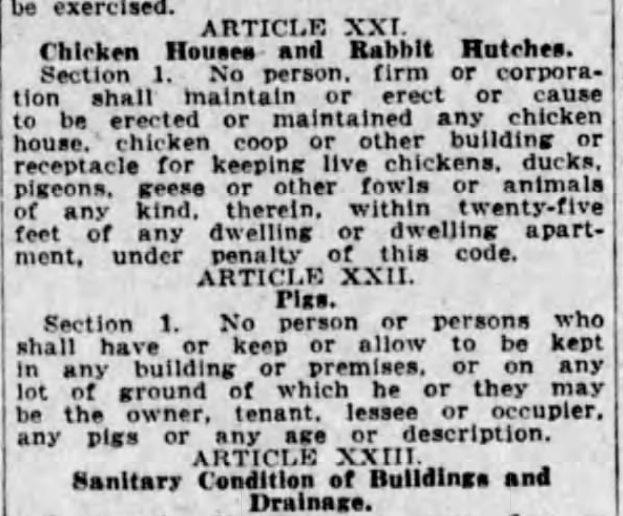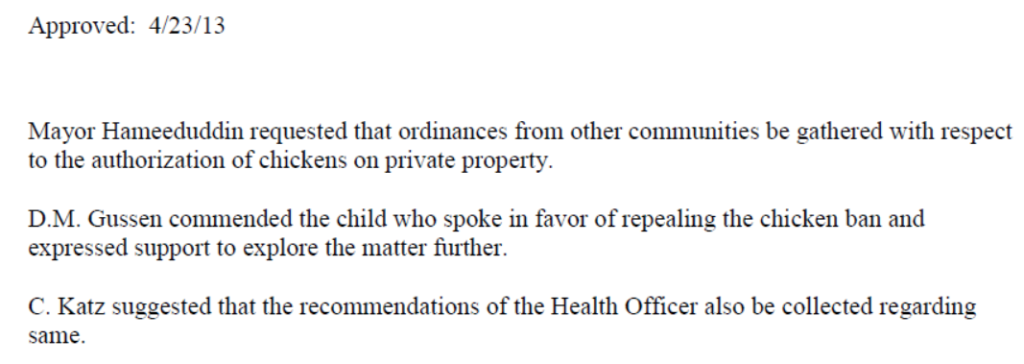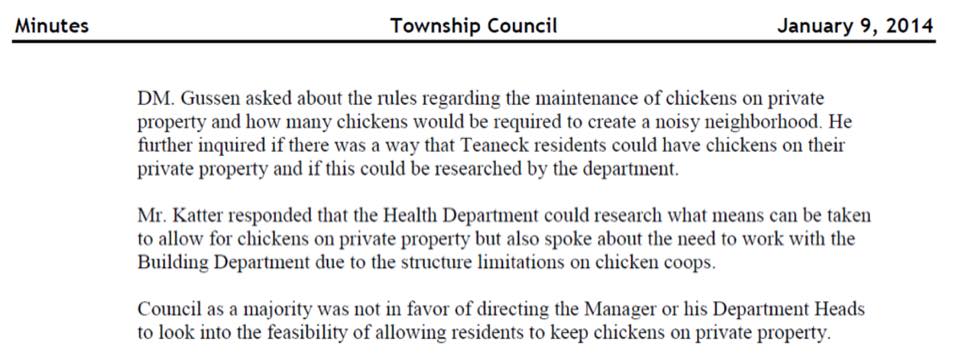People like raising chickens. They give delicious eggs and people that raise them say that it’s a clean sustainable pet/food source that should be available in Teaneck.
There’s also a local ordinance prohibiting it:
Sec. 6-5: Keeping of pigs, horses and certain other animals prohibited.
No person shall keep or allow to be kept in any building or premises, or on any lot of ground of which he may be the owner, tenant, lessee or occupier, any pigs, horses, mules, cows, pigeons or poultry of any age or description.
It even has a Facebook Group: Keep Chickens Teaneck
So what’s the deal with chickens and this ban?
A movement is born
Totally agree with Adam J. Gussen – let the chickens come home to roost!
Posted by Keith Kaplan on Tuesday, January 7, 2014
As you’ll see, then councilmember Schwartz responded:
“Sorry- not going to allow chickens to be raised in Teaneck. Health department listed many solid reasons (vermin, large animals etc) plus I’m the one who is going to get complaints from the upset neighbors. And rightfully so. I heard Sussex county has some great farms for sale… Go for it… you can move, stay and suck it up or simply run for office and push your rural agenda through.”
Clearly, challenging me has repercussions, but that’s for another thread.
What did the Health Department say?
These ordinances (6-5) and (6-6) were originally adopted in 1951. Back then, Teaneck was far more farm, less developed and less suburban than today. The animals listed in the prohibition of keeping and ownership include farm animals (pigs, cows, horses, etc.), including fowl (ie: chickens, ducks, etc.). These animals, if allowed, will change the quality of life in Teaneck. These animals create unnecessary noise, attract vermin, create odors, all of which will generate numerous complaints. The keeping of poultry may also increase a presence of more dangerous predators like coyote and fox. The more wild animals drawn to the area create a public health risk of zoonotic diseases like rabies and tick borne diseases and can result in more potential car accidents and/or road kill. Over the years, we have had people requesting to allow such animals as pigs, chickens and bees for all good purposes such as pets,food, pollination of home gardens, etc. I do understand these desires for personal purposes, economics and being a naturalist.
As the health officer, I do have the responsibility to protect the public health and quality of life as I see appropriate. The 3 health officers that preceded me also felt that same way and this ordinance has been in effect ever since. I see no reason to amend the ordinance.
– Ken Katter, Health Officer, CPM
(obtained via OPRA)
What did the Building Department say?
I have reviewed the Teaneck Town Code as it relates to this resident’s request to raise chickens on private property and offer the following comments:
-
Chapter 33, Development Regulations, does not have the keeping or raising of chickens as either a conditional use or accessory use to any of the permitted uses in any of the zone districts. Any request to raise chickens would, at the minimum, require the Zoning Board of Adjustment to interpret the zoning ordinance and determine whether the raising of chickens falls within the definition of accessory use (A subordinate use or building, the purpose of which is incidental to that of a main use or building on the same lot). The burden of proof at this hearing would be on the applicant to show that the raising of chickens would not undermine the goals and objectives of the Teaneck Master Plan including to preserve the character of existing low-density residential neighborhoods. If the Zoning Board of Adjustment determines that the raising of chickens is not an accessory use in a zone district, a variance must be obtained and the applicant would need to prove that the benefit of approving such variance outweighs the negative impact of the use.
-
The selling of chickens or eggs would be considered a business and, if conducted on a residential property, would be a prohibited use. The ability to sell chickens or eggs would require an applicant to obtain a variance from the Zoning Board of Adjustment to conduct a business from the residential property.
-
Structures used to house chickens would be considered accessory structures and need to complywith the current bulk requirements.
The Township of Teaneck developed from its rural roots into a suburban community and continues to experience the trend towards a more dense physical environment. The smaller size of the average residential lot may not provide the ability of the property owner to buffer this type use (raising of chickens) from adjacent properties, rendering the use inappropriate for most neighborhoods. If this request will be considered further, I recommend that the Township Planner provide input to assure that any modification of the regulations does not negatively impact the Master Plan document.
I’m still of the opinion that this can be done well, as it’s been done in other locations. Neighbor concerns are valid, but capable of being addressed via appropriate zoning/legislation and permitting.
Having heard from those in favor, the current council majority has indicated that they may be willing to change the ban, effectively signaling the ending of 84 years of poultry prohibition. Other towns have done so and they seem to have had very few issues, so I believe it’s possible.
But, history has shown that when people start to come out against, those maybe’s sway back to no’s.
So…. don’t count your chickens before they’re hatched.
To be continued.
Notes:
- It’s unclear if this ordinance was in any way related to the incident that took place in 1932. It’s recounted during the August 23, 1932, Council discussion on Ordinance #639 “AN ORDINANCE TO PRE&ERVE AND MAINTAIN PEACE AND ORDER AT ALL MEETINGS, GATHERINGS AND ASSEMBLIES THROUGHOUT THE TOWNSHIP OF TEANECK.
There was a lively debate over the issue, which inevitably led to the failure of passage. But during the back and forth, Mr. Walker posed a question to Mr. Morton.Mr. Walker asked Mr. Morten, through the Chairman, whether any previous meeting would have come under this ordinance? Did he think anyone would havebeen brought up for prosecution under this ordinance if it had been in effect?”Mr. Morten responded: “I rather think that man who brought the chicken would have been under it.”
In his final remarks as Manager after serving Teaneck for over 20 years, Mr. Volcker spoke about this particular incident.
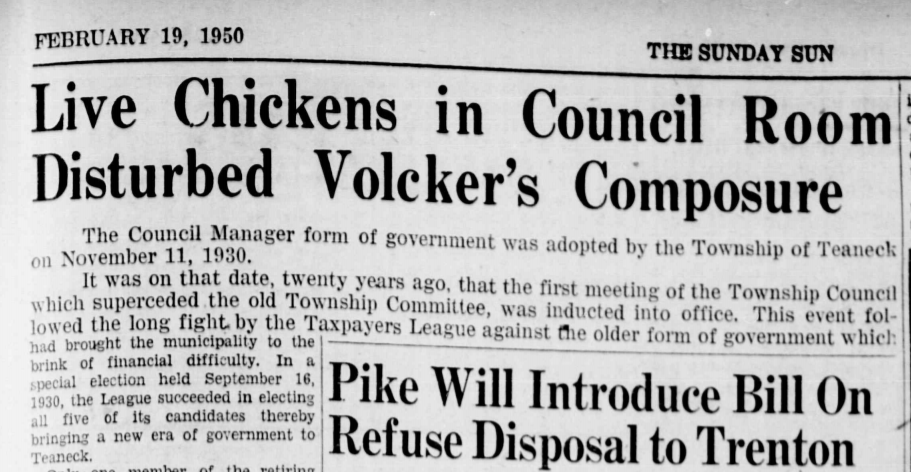
“Teaneck’s council meetings in those days were not the well-ordered gatherings they are today, Volcker recalls. There were frequent catcalls as the new council tried to conduct its business. On one occasion a citizen brought a live chicken under his coat. At points in procedure to which the citizen objected, he squeezed the fowl vigorously. The resultant squawking added to the confusion of the meeting.”
Source: Teaneck Library archives
